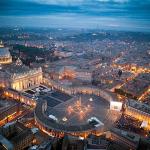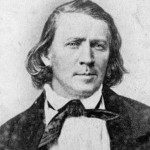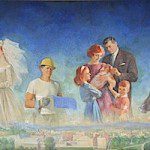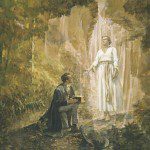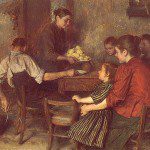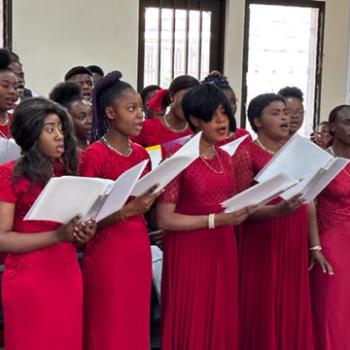
This article reprint has just gone up on the website of the Interpreter Foundation: The Temple: Symbols, Sermons, and Settings: The Symbolism of the Cupped Hand in Ancient Egypt and Israel: Iconography, Text, and Artifact, written by Stephen O. Smoot
Part of our book chapter reprint series, this article originally appeared in The Temple: Symbols, Sermons, and Settings, edited by Stephen D. Ricks and Jeffrey M. Bradshaw. For more information, go to https://interpreterfoundation.org/books/the-temple-symbols-sermons-and-settings/.
“In a 1983 study, Lynn M. Hilton explored the concept of the hand as a cup in ancient temple worship.1 Hilton’s analysis of the imagery of the cupped hand as a ritual gesture offered some useful initial exploratory insight. This article builds on Hilton’s analysis and points to additional iconographic, textual, and artifactual forms of evidence for the cupped hand as a ritual gesture in ancient Egypt and Israel. As this evidence makes clear, in both ancient Egypt and ancient Israel, an important ritual action was to fill the cupped hand with offerings for the deity. These offerings could be made by either directly filling the palms of the hands or through the use of cultic vessels shaped as a cupped hand. Furthermore, in ancient Egypt, the outstretched cupped hand could also represent the petitioner receiving blessings from the deity as opposed to making an offering, while in ancient Israel, the action of filling the (cupped) hand was directly linked with being consecrated in a priestly capacity.”
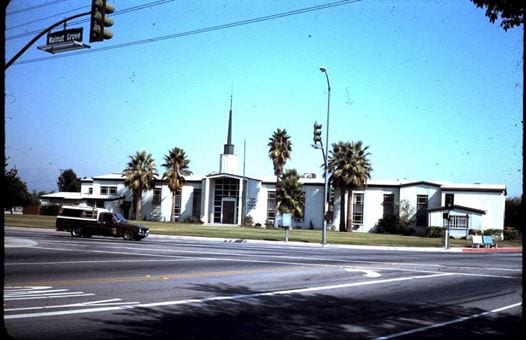
In the Southern California chapel — now long demolished — where my childhood wards met, the chapel that I attended sporadically as a young boy and more regularly as a youth, and from which I set off for Brigham Young University and, eventually, for my mission to Switzerland, a large plaque was displayed on the front wall, to the speaker’s left behind the sacrament table. It read as follows:
And again, inasmuch as parents have children in Zion, or in any of her stakes which are organized, that teach them not to understand the doctrine of repentance, faith in Christ the Son of the living God, and of baptism and the gift of the Holy Ghost by the laying on of the hands, when eight years old, the sin be upon the heads of the parents.
For this shall be a law unto the inhabitants of Zion, or in any of her stakes which are organized.
And their children shall be baptized for the remission of their sins when eight years old, and receive the laying on of the hands.
And they shall also teach their children to pray, and to walk uprightly before the Lord. (Doctrine and Covenants 68:25-28)
I can still see that plaque clearly in my mind, and I’ve never forgotten it, neither the words that were emblazoned upon it. It was intended, of course, to remind parents to ensure that their children were taught the principles of the Gospel, and that the parents modeled Gospel-oriented lives for their children.
In not a few cases, when the Gospel is not passed on to children, the fault does lie at the feet of parents who failed to adequately and conscientiously teach or exemplify it. But even good and faithful parents lose children. God the Father himself — presumably the very best of parents — lost a third of his children in the premortal world.
And this we saw also, and bear record, that an angel of God who was in authority in the presence of God, who rebelled against the Only Begotten Son whom the Father loved and who was in the bosom of the Father, was thrust down from the presence of God and the Son,
And was called Perdition, for the heavens wept over him—he was Lucifer, a son of the morning. (Doctrine and Covenants 76:25-26)
Moreover, the scriptures testify that God mourns over those of his mortal children who reject the covenants and principles of the Plan of Salvation, the Plan of Happiness. I think often of the vision of Enoch that is recorded in Moses 7, one of my favorite passages in all of the Standard Works:
And he beheld Satan; and he had a great chain in his hand, and it veiled the whole face of the earth with darkness; and he looked up and laughed, and his angels rejoiced. . . .
And it came to pass that the God of heaven looked upon the residue of the people, and he wept; and Enoch bore record of it, saying: How is it that the heavens weep, and shed forth their tears as the rain upon the mountains?
And Enoch said unto the Lord: How is it that thou canst weep, seeing thou art holy, and from all eternity to all eternity?
And were it possible that man could number the particles of the earth, yea, millions of earths like this, it would not be a beginning to the number of thy creations; and thy curtains are stretched out still; and yet thou art there, and thy bosom is there; and also thou art just; thou art merciful and kind forever;
And thou hast taken Zion to thine own bosom, from all thy creations, from all eternity to all eternity; and naught but peace, justice, and truth is the habitation of thy throne; and mercy shall go before thy face and have no end; how is it thou canst weep?
The Lord said unto Enoch: Behold these thy brethren; they are the workmanship of mine own hands, and I gave unto them their knowledge, in the day I created them; and in the Garden of Eden, gave I unto man his agency;
And unto thy brethren have I said, and also given commandment, that they should love one another, and that they should choose me, their Father; but behold, they are without affection, and they hate their own blood;
And the fire of mine indignation is kindled against them; and in my hot displeasure will I send in the floods upon them, for my fierce anger is kindled against them.
Behold, I am God; Man of Holiness is my name; Man of Counsel is my name; and Endless and Eternal is my name, also.
Wherefore, I can stretch forth mine hands and hold all the creations which I have made; and mine eye can pierce them also, and among all the workmanship of mine hands there has not been so great wickedness as among thy brethren.
But behold, their sins shall be upon the heads of their fathers; Satan shall be their father, and misery shall be their doom; and the whole heavens shall weep over them, even all the workmanship of mine hands; wherefore should not the heavens weep, seeing these shall suffer? (Moses 7:26, 28-37)
And many earthly parents, as well, have had the sad, painful experience of watching their children choose wrongfully, foolishly, irresponsibly, and dangerously. In fact, it is a frequent motif in scripture. The example of the prophet Lehi comes readily to mind:
And it came to pass that I beheld a tree, whose fruit was desirable to make one happy. . . .
And as I partook of the fruit thereof it filled my soul with exceedingly great joy; wherefore, I began to be desirous that my family should partake of it also; for I knew that it was desirable above all other fruit. . . .
And it came to pass that I was desirous that Laman and Lemuel should come and partake of the fruit also; wherefore, I cast mine eyes towards the head of the river, that perhaps I might see them.
And it came to pass that I saw them, but they would not come unto me and partake of the fruit. (1 Nephi 8:10, 12, 17-18)
The Savior’s parable of the Prodigal Son is another example, as is the story of Alma the Younger, who rebels against the teachings of his father, and as is, in turn, the story of that Alma’s own son Corianton. I think also of Absalom, the disloyal son of King David, who was slain while in open rebellion against his father, and of the powerfully emotional setting by the early American composer William Billings (1746-1800) of 2 Samuel 18:33, “David’s Lamentation” :
David the king was grieved and moved;
He went to his chamber, his chamber, and wept;
And as he went, he wept and said,
O my son! O my son!
Would to God I had died,
Would to God I had died,
For thee, O Absalom, my son, my son!
“I have no greater joy,” says 3 John 1:4, “than to hear that my children walk in truth.”
Given the context, the apostle is presumably speaking primarily if not solely of his converts, his metaphorical children in the gospel, not of his own biological children. But surely there are few joys greater than seeing one’s actual children living in harmony with the Gospel of Jesus Christ, and raising their own children to do so, as well. By the same token, however, there are few sorrows so acute as watching one’s children choose to leave the covenant path and to “wander in strange roads.”
But not even great prophets and apostles are immune to such sorrow. The Interpreter Foundation recently published a small selection of “Letters from Elder Spencer W. Kimball” that are unfortunately relevant in this context.
[Note: Levan was beginning to distance himself from the Church at the time and eventually became atheist. His father was deeply concerned and used this missive as a means of trying to fortify him in the faith. Slight editing has been done for readability.]
As I’ve noted above, the scriptures contain more than a few stories about wayward children. But they also offer hope: While neither Absalom, Laman, nor Lemuel (nor, for that matter, Spencer Levan Kimball) returned to the covenant path in this mortal life, Alma the Younger and Corianton and the parable’s Prodigal Son did.
But is there any hope for those who forsake the covenant path and don’t return in this life? Is there any hope for those who love them?
Elder Orson F. Whitney (1855–1931), a former member of the Quorum of the Twelve Apostles, offered this encouraging statement in 1929:
The Prophet Joseph Smith declared—and he never taught more comforting doctrine—that the eternal sealings of faithful parents and the divine promises made to them for valiant service in the Cause of Truth, would save not only themselves, but likewise their posterity. Though some of the sheep may wander, the eye of the Shepherd is upon them, and sooner or later they will feel the tentacles of Divine Providence reaching out after them and drawing them back to the fold. Either in this life or the life to come, they will return. They will have to pay their debt to justice; they will suffer for their sins; and may tread a thorny path; but if it leads them at last, like the penitent Prodigal, to a loving and forgiving father’s heart and home, the painful experience will not have been in vain. Pray for your careless and disobedient children; hold on to them with your faith. Hope on, trust on, till you see the salvation of God.” (Orson F. Whitney, in Conference Report [April 1929], 110)
Here are links to a pair of recent discussions on this topic that offer comfort for those whose loved ones have gone astray:
Emily Linder, “2 doctrines to hold on to when your child steps away from the Church”
Elder David L. Bednar, “Faithful Parents and Wayward Children: Sustaining Hope While Overcoming Misunderstanding” [Elder Bednar expressly comments on the passage from Elder Whitney that is cited immediately above, doctrinally clarifying and defining it.]
May God grant hope and peace to all those who sorrow because of wandering family members.


